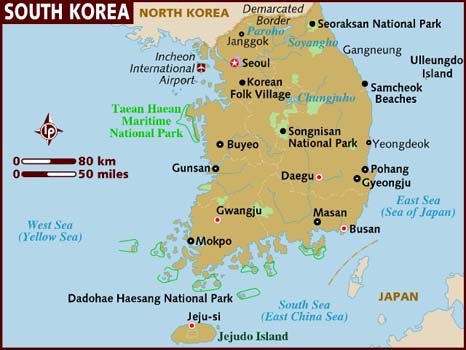South Korea rolls out 5G service
April 5, 2019 | Expert Insights
South Korea will become the first country to commercially launch fifth-generation (5G) services on 5th April 2019 as it rolls out the latest wireless technology with Samsung Electronics’ new 5G-enabled smartphone Galaxy S10.
Background
5G (from "5th Generation") is the latest generation of cellular mobile communications. It succeeds the 4G, 3G, and 2G systems. 5G performance targets high data rate, reduced latency, energy saving, cost reduction, higher system capacity, and massive device connectivity.
The first phase of 5G specifications in Release-15 will be completed by April 2019 to accommodate the early commercial deployment. The second phase in Release-16 is due to be completed by April 2020 for submission to the International Telecommunication Union (ITU) as a candidate for IMT-2020 technology.
Development of 5G is being led by companies such as Huawei, Intel and Qualcomm, for modem technology and Cisco, Ericsson, Huawei, Nokia, Samsung and ZTE, for infrastructure. Worldwide commercial launch is expected in 2020. Numerous operators have demonstrated 5G as well, including Korea Telecom for the 2018 Winter Olympics and Telstra at the 2018 Commonwealth Games.
As of February 2019, the Global Mobile Suppliers Association had identified 201 operators in 83 countries that are actively investing in 5G.

Analysis
With one of the world’s top smartphone penetration rates, South Korea is in a race with China, the United States and Japan to market 5G, hoping the technology will spur breakthrough in fields such as smart cities and autonomous cars, and drive up its economic growth that slowed to a six-year low in 2018.
“It is meaningful that South Korean telecom companies are providing services and networks meeting South Korean customers’ high standard in speed and picture quality,” Ryu Young-sang, executive vice president at the country’s top mobile carrier SK Telecom, said. 5G will change the landscape of the gaming industry as it allows games streamed with minimal delay to be played on smartphones, Ryu added.
The technology can offer 20-times faster data speeds than 4G long-term evolution (LTE) networks and better support for artificial intelligence and virtual reality with low latency. South Korean carriers have spent billions on campaigns marketing 5G and, on Wednesday, SK Telecom showed off K-pop stars and an Olympic gold medalist as its first 5G customers.
SK Telecom is working with its memory-chip making affiliate SK Hynix to build a highly digitized and connected factory powered by 5G technology, Ryu said. The operator expects about 1 million 5G customers by end-2019. It has a total of 27 million users. Their smaller rival KT Corp is set to offer cheaper plans than its LTE service, with unlimited data and 4-year instalments to buy 5G devices.
Samsung was the first to unwrap a 5G phone in February when it unveiled the Galaxy S10 5G and a nearly $2,000 folding smartphone, putting the world’s top smartphone maker by volume, in pole position in the 5G race, some analysts say.
While security concerns over 5G networks using telecom equipment made by China’s Huawei have marred the build-up to the release of these services, South Korean telcos have tried to shrug them off. He added that the company uses advanced technology to block eavesdropping or hacking into 5G networks.
Among South Korea’s top three telecom operators, SK Telecom and KT Corp do not use Huawei equipment for 5G. Smaller carrier LG Uplus uses Huawei gear. However, SK Telecom officials said it was likely there will be an open auction for network equipment makers, including Huawei if South Korea needs more base stations for higher frequencies.
Smaller local rival LG Electronics plans to release its 5G smartphone in South Korea later this month. In the United States, carrier Verizon plans to launch its 5G network in two cities on April 11.
Assessment
Our assessment is that South Korea’s massive and innovative smartphone industry has enabled it to deploy cutting edge telecommunication networks months head of a global roll out of comparable scale. We believe that South Korea’s per capita income, smartphone penetration and mobile data prices allows it to invest and leverage the 5G network, as opposed to other markets like India and even China, where mobile data is expensive and infrastructure is lacking.
Image Courtesy: No machine-readable author provided. Fsaeed1975 assumed (based on copyright claims). (https://commons.wikimedia.org/wiki/File:Base_transceiver_station.jpg), „Base transceiver station“, https://creativecommons.org/licenses/by/3.0/legalcode








Comments